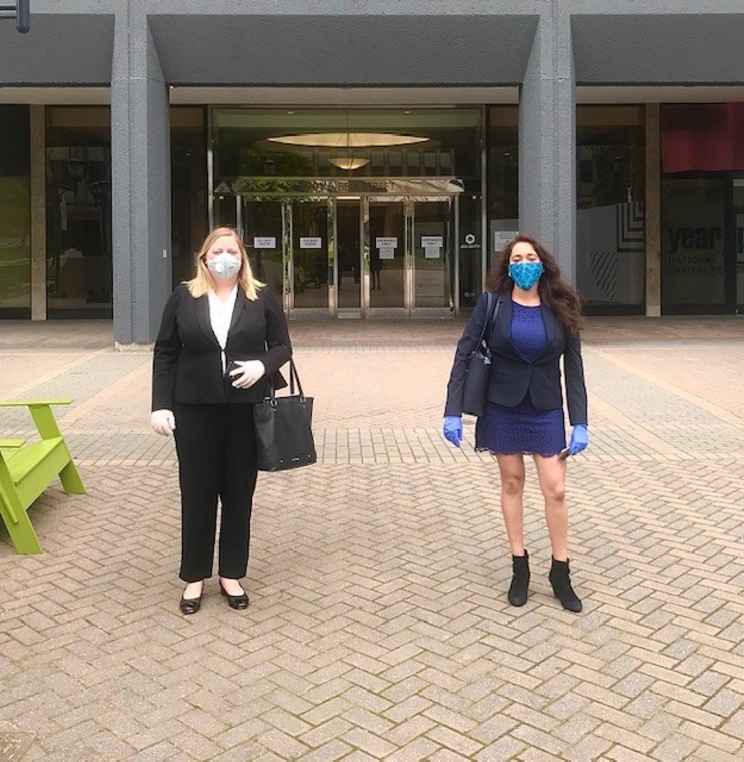Immigrant Justice Clinic Student Attorneys Overcome Challenges of COVID-19 to Represent Client in Court
June 3, 2020

AUWCL’s Immigrant Justice Clinic (IJC) was a key reason Shazreh Khan ’20 and rising 3L Audrey Vorhees decided to attend Washington College of Law, and that passion to help others has extended through the global pandemic.
“Before attending law school, I worked as a case worker in refugee resettlement and knew I wanted to continue serving immigrant communities in some capacity through the legal profession,” Vorhees said. “The Immigrant Justice Clinic was the primary reason I decided to attend WCL.”
“I had worked at a non-profit for asylum seekers before attending law school and I knew I wanted to practice immigration law. In my 1L Spring semester I took Immigration and Naturalization with Professor [Jayesh] Rathod. Taking his course reaffirmed my desire to go into the field. I joined the Immigrant Justice Clinic as a 3L,” Khan said.
Over two months ago, the IJC was referred a case by the Capital Area Immigrant Rights (CAIR) Coalition involving an asylum claim by an LGBT individual facing persecution on account of their sexuality, Vorhees said. The pair began working with supervising attorney Rathod, IJC director, despite the obstacles imposed by COVID-19. Vorhees and Khan drove to meet with their detained client shortly before the Farmville Detention Center in Virginia suspended in-person visits in response to the pandemic.
“We were able to have him sign representation documents and gather all the documentation we needed from him. It was important for us to meet with him in-person and start building the client-attorney relationship, especially considering how understandably frustrated he had become from his long detention,” Khan explained.
The challenges continued as the detention center suspended video-telephone conference calls, causing the student attorneys to set up a schedule to call at designated times on specific days in order to speak with their client – sometimes having to wait for his call before proceeding. The group had a master calendar hearing telephonically to establish Vorhees and Khan as the new attorneys on the case and to address any preliminary issues. The Department of Homeland Security (DHS) attorneys, however, wanted to introduce certain evidence in person, Khan said, and there was a standing order barring them from appearing in person – pushing the hearing off a few weeks until May 20.
“Masked and gloved, we arrived at [Arlington Immigration Court] a court that was relatively empty since non-detained cases had been postponed,” said Khan, who has plans to take the DC Bar in September and is awaiting word on funding for a legal fellowship related to asylum and refugee work. “Social distancing in court wasn't difficult,” said Khan.
The hearing lasted three hours, Vorhees said.
“It was a demanding hearing because DHS challenged every aspect of our client's claim, but we were prepared and held our own. The judge ultimately decided the case warranted a written decision instead of an oral one, so we actually still don't know the outcome and probably won't for at least another week or two,” Vorhees explained.
“Clinic is a real-life lawyering experience, which requires students to navigate uncertain and changing conditions, while upholding their ethical obligations to clients," said Rathod. "Over the past few months, we have faced formidable obstacles in our case work. In the face of these challenging conditions, Audrey and Shazreh were persistent and determined, and provided their client with high-quality representation.”
The Immigrant Justice Clinic (IJC), part of American University Washington College of Law’s top ranked Clinical Program, provides representation on a broad range of cases and projects involving individual immigrants and migrants, and their communities, both in the DC metropolitan area and overseas. Student attorneys in the IJC regularly appear in Immigration Court, and may also appear before federal district court, the courts of Maryland and DC, and before federal and state agencies. Learn more here.